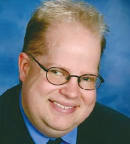
We need everyone—oncologists, scientists, patient advocates, and survivors—to work together to make sure that all patients, not just the ones who can afford the best care, get the same chance at a long, productive life.— Brett Wilson
Tweet this quote
When I was diagnosed with acute lymphocytic leukemia (ALL) at the age of 2 in 1974, not much was known about the cancer or the side effects of its treatment. Too young to understand what was happening to me, the burden fell to my parents and older sibling to protect and care for me. For more than 5 years, my parents drove me to our community hospital for my treatment, which consisted of unending rounds of CHOP (cyclophosphamide, doxorubicin, vincristine, and prednisone) chemotherapy plus radiation to my brain. The treatment cured me of my ALL, but a year and a half after my treatment ended I was diagnosed with non-Hodgkin lymphoma. Now 9 years old, I had a better sense of the seriousness of my illness. I was prescribed additional treatments of CHOP and radiation to my chest. The treatment was so intense it nearly killed me twice.
In between treatments I was allowed to return to school, but my life was difficult. In the early 1980s, there were still a lot of misconceptions about cancer. My classmates wouldn’t come near me because they were afraid of “catching” the disease, and they taunted me over the way I looked. The treatments left me bald and overweight, and I had difficulty comprehending my schoolwork, especially math, all of which made perfect targets for ridicule.
Their insults became so unbearable I avoided going to my classes; it was just too hard fighting the cancer and the bullies at school, and instead I chose to have private tutoring. But the decision only left me feeling even more isolated from my peers and separated from the experiences of having a normal childhood. The feeling was so pronounced, I made a vow to myself when I was 12 that if I survived this cancer, I would do everything in my power to prevent other children and their families from going through the difficulties my family and I were going through.
Overcoming Obstacles
As an adolescent, I didn’t fully understand the ramifications of the cancer treatment on my developing brain and body—back then very little was known about their full impact—and some of long-term physical effects of the treatment, including heart disease, partial loss of sight in my right eye, infertility, and growth problems, did not become clear until years later. I knew I was having trouble understanding math, and my short-term memory made it difficult for me to retain information from my other subject lessons, so I did poorly on tests.
Still, I persevered, and with the help of tutors, I learned to use verbal-repetition techniques to memorize dates and facts. I graduated from college and went on to attain a master’s degree in community agency counseling.
Fulfilling a Wish
Although I overcame my learning disabilities early in adulthood, my problems with heart failure did not manifest until I was 35 years old. By then, I needed a pacemaker to enforce a regular normal heartbeat, and 3 years ago I had my aortic valve replaced.
With my physical problems behind me, in 2012 I founded Walking Miracles, a nonprofit organization to provide young patients with cancer and their families psychosocial support, patient navigation services, and travel assistance programs. The program was launched in my home state of West Virginia—the second poorest state in the country following Mississippi—to help families find the resources they need to subsidize traveling expenses to and from cancer treatment centers, among other things. Data from surveys we’ve done have shown that families affected by cancer in my state spend 38% of their income on travel, food, and lodging, which for most West Virginians is unsustainable for treatments lasting more than a few weeks.
The economic impact of cancer on families cannot be overestimated, and I’m glad to see that the cost of cancer care is gaining national attention. Still, more needs to be done to make cancer more affordable to the hundreds of thousands affected by the disease each year.
It is also the goal of Walking Miracles to advocate for more state and federal dollars to fund programs for research in childhood cancers and in programs to support children and their family members throughout survivorship. I’m grateful that although overall cure rates for childhood cancers has risen to 80%—and up to 90% for some pediatric cancers—over the past 6 decades, not as much attention has been paid to the lifetime consequences of those cures, which can have far greater repercussions—physical, emotional, and financial—for a child diagnosed at age 5 than for an older adult diagnosed at age 65.
Working Together
I am thrilled to see that pediatric cancer is now one of the scientific areas of opportunity of the National Cancer Moonshot Initiative. I’m hoping that having this kind of dedicated focus in cancers that affect children will result not just in more cures but in improving the lives of these young survivors over the long term.
A lot has changed since I made that vow 31 years ago. The stigma of having cancer has waned, there are more targeted therapies for children with cancer, and more survivors are living long lives. But our work is not done.
We need everyone—oncologists, scientists, patient advocates, and survivors—to work together to make sure that all patients, not just the ones who can afford the best care, get the same chance at a long, productive life. ■
Mr. Wilson lives in Hurricane, West Virginia. He is the Founder and CEO of Walking Miracles of West Virginia, a nonprofit organization dedicated to providing counseling and financial resources for cancer survivors.

